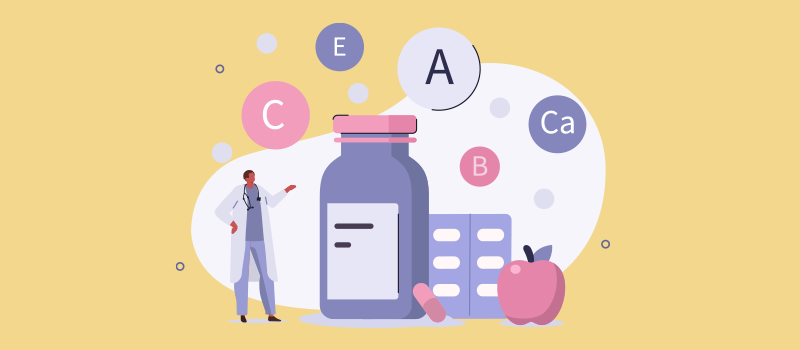What’s the Buzz
The Bee Healthy Blog
The Importance of Vitamin C and Calcium

Vitamin C and calcium are important nutrients and two of the most common dietary supplements available on supermarket shelves. This article will help you understand the health benefits of vitamin C and calcium, the recommended daily intake of these vital nutrients, and food sources rich in vitamin C and calcium. We will also talk about the signs and symptoms of vitamin C deficiency and calcium deficiency and whether you need to take supplements.
What is vitamin C?
Vitamin C (also called ascorbic acid) is an essential vitamin. It is a water-soluble vitamin, meaning it dissolves in water to be transported to the various tissues in the body. However, ascorbic acid is not stored in the body, so you need to obtain it through dietary vitamin C or supplements.
Why is vitamin C important?
Vitamin C plays an important role in immune system function, infection control, and wound healing. Along with other antioxidant vitamins like vitamin E, it neutralizes harmful molecules called free radicals. Vitamin C is also required for collagen synthesis. Collagen is a protein present in various tissues throughout the body, such as the skin, bones, cartilages, nerves, connective tissues, and others. Additionally, intake of vitamin C is necessary to make many chemical messengers and hormones in the body. Vitamin C also plays a role in iron absorption.
What is the recommended vitamin C intake? Do I need vitamin C supplements?
The Recommended Dietary Allowance (RDA) of vitamin C for adults aged 19 years and older is 75 mg per day in women and 90 mg per day in men. The RDA is higher in certain people like pregnant women (85 mg/day), breastfeeding women (120 mg/day), and smokers (an additional 35 mg/day).
High vitamin C intakes of up to 2,000 mg daily are unlikely to cause any harm. However, taking more vitamin C than the maximum tolerable upper intake level of 2,000 mg/day can lead to symptoms such as stomach pain and diarrhea.
As mentioned above, vitamin C is not stored in the body, so you need to include it in your diet every day. You should be able to get all the vitamin C you need by eating a healthy, balanced diet. If you are taking vitamin C supplementation in addition to dietary vitamin C intake, do not take too much. Supplemental vitamin C under 1,000 mg/day is generally safe.
What are food sources of vitamin C?
The best way to ensure adequate dietary vitamin C intake is to pay attention to your fruit and vegetable intake. Citrus fruits (oranges, grapefruits, lemons, kiwis) and strawberries are rich in vitamin C. Vegetables like bell peppers, tomatoes, broccoli, cauliflower, cabbage, white potatoes, and Brussels sprouts are also vitamin C-rich foods.
What are the signs and symptoms of vitamin C deficiency?
Vitamin C deficiency is not common in the United States. Risk factors for a low vitamin C status include restrictive diets that do not include fruits and vegetables, smoking, and drug, gastrointestinal surgeries or alcohol abuse.
The condition most commonly associated with severe vitamin C deficiency is scurvy. In this condition, a loss of collagen and weak connective tissues cause symptoms such as bleeding in the skin, swelling and bleeding of the gums, hair loss, and delayed wound healing. Other symptoms of vitamin C deficiency can include fatigue and iron deficiency anemia due to decreased iron absorption.
Does vitamin C protect against certain health conditions?
Many people believe that taking megadoses of vitamin C can reduce cardiovascular disease risk and cancer risk and protect against chronic diseases like age-related macular degeneration.
However, randomized controlled trials have not found that taking vitamin C supplements reduces the risk of major cardiovascular events or cancer. Also, studies have not shown that supplemental vitamin C prevents age-related macular degeneration. However, there does appear to be a link between high fruit and vegetable intake and a lower risk of cataracts.
The infection-fighting effect of vitamin C has made it a popular remedy for the common cold. However, research suggests that higher dietary vitamin C or supplemental megadoses (over 500 mg per day) do not significantly prevent common colds or relieve symptoms. Nonetheless, some small clinical trials have shown that vitamin C may reduce the duration and severity of colds in some people.
What is calcium?
Calcium is the most abundantly found mineral in the body. It is present in some foods and can also be taken as a dietary supplement. Approximately 98% of the calcium in the body is stored in the bones. The body uses the bones as a reservoir, storing calcium in bones when it is not needed and pulling calcium from the bones when other organs in the body need it.
Why is calcium important?
Calcium is a critical structural component of bones and teeth. It is therefore vital for bone health and helps maintain the structure of bones, making them strong and flexible. A small amount of calcium is present in the blood, extracellular fluid, and various other tissues. This calcium plays important roles in nerve signaling, muscle function, blood clotting, blood vessel narrowing and widening, and hormone secretion.
What is the recommended calcium intake?
The Recommended Dietary Allowance (RDA) for adult men and women aged 19 years and older is 1,000 mg of calcium per day.
What are the food sources of calcium?
Dairy products like milk, cheese, and yogurt are some of the best food sources of calcium. Non-dairy sources of calcium include vegetables like kale and broccoli and canned fish like sardines and salmon. Many foods are fortified with calcium, such as fruit juices and cereals.
What are the signs and symptoms of low calcium?
Chronic calcium deficiency can lead to osteomalacia or soft bones in adults and children. Calcium deficiency can also lead to low bone mineral density (weak bones). This condition is called osteoporosis, and it is associated with an increased risk of bone fractures.
In children, calcium deficiency can cause a condition called rickets, in which the bones are soft and weak.
Other signs and symptoms of low calcium may include numbness and tingling, muscle spasms, neurologic symptoms, seizures, and, rarely, coma.
Wrapping Up
Both vitamin C and calcium are essential nutrients with many health benefits. Ensuring adequate nutrient intake through diet and supplementation can protect you from many health problems associated with a deficiency of these nutrients. However, high plasma vitamin C concentrations and calcium concentrations can also cause problems. That’s why it is important to eat a healthy, balanced diet and discuss calcium and vitamin C supplementation with a healthcare professional who can advise you on whether you need supplements.
References:











SOCIAL